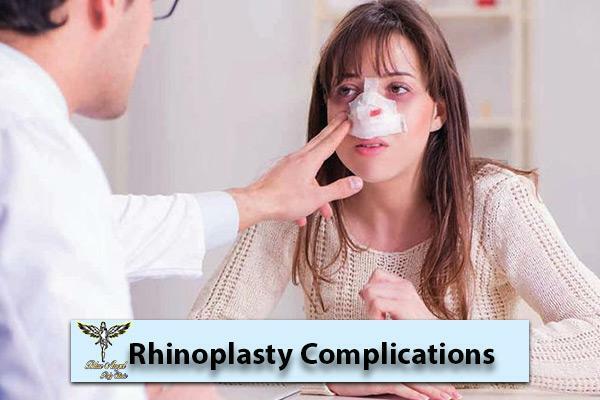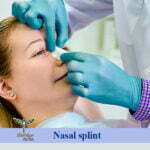Rhinoplasty Complications
Rhinoplasty is a surgical procedure that changes the shape and function of the nose and in addition to improving the appearance of this organ, it also helps to improve the quality of breathing through the nose. This surgery is generally known as a safe process, but like any other surgical process, rhinoplasty complications after this process are inevitable. The best rhinoplasty surgeon in Dubai, will explain all possible risks and how to prevent them during recovery time.

The rhinoplasty complications are as follows:
Infection after nose surgery
There is always the potential risk of infection as one of the side effects of nose job, like any other type of surgery. Nose job is no exception, although in general, infection occurs in rare cases in this surgery. To shape the nose during surgery, small incisions are created. The skin acts as a natural barrier against bacterial infections, but pathogens can use any gap or hole to pass through the skin shield and enter the body.
Experiencing mild pain and swelling as one of the rhinoplasty complications is completely normal. Of course, when pain and swelling worsen, it can be considered a sign of infection. This issue becomes especially important when the area where the pain and swelling are experienced becomes red and warm and yellow or green fluid drains from the cut area.
In such a situation, you should see a doctor as soon as possible. The purpose of visiting the best rhinoplasty surgeon in Dubai as soon as possible is to prevent the spread of infection and other problems. See your doctor if you experience any of the following:
⦁ Abnormal swelling
⦁ constant pain
⦁ A red that does not subside.
⦁ Discharge of yellow or green discharge from the incision site
⦁ Fever
⦁ Warming of the skin and feeling hot to the touch
⦁ Bad smell from the cut area
Excessive bleeding from the nose
A better understanding of the cause of infection and advances in surgical techniques have helped control infection as one of the rhinoplasty complications. Sometimes infection happens due to the lack of proper care after nose surgery.
In some rare cases, if the surgical procedure is performed by a surgeon who is not committed to the patient’s health, bacteria can enter the body due to the non-sterility of the surgical environment. In some cases, the failure of the patient to perform post-operative care is the cause of the transfer of bacteria to the body. To prevent such problems, consider the following points:
⦁ Attend follow-up sessions.
⦁ Follow the post-operative instructions carefully.
⦁ Keep the incisions dry and clean.
⦁ Change the dressing carefully and on time.
⦁ Allow the cut to air dry completely before applying a new dressing.
⦁ Get plenty of rest to help boost your immune system.
⦁ If you notice signs of infection, see a doctor immediately.
Bleeding after nose surgery
Bleeding after nose surgery is completely normal and is an expected part of the recovery period. Patients should change the sterile gauze under the nose every few hours. Applying pressure to the nose can aggravate the bleeding. So try to rest and avoid heavy activities. If the bleeding does not stop after a few days, see a doctor.
Rhinoplasty complications – swelling, brushing, and pain
Swelling after nose surgery
The severity of the swelling, as another rhinoplasty complications, depends on various factors such as the type of nose, the thickness of the nose skin, the amount of work done on the nose during surgery, and the patient’s post-operative care. In addition, the amount of nasal swelling varies in different people. Swelling is more in fleshy noses with thick skin, and the duration of swelling and recovery will be longer.
During open rhinoplasty, in which incisions are made in the nostrils, the amount of swelling will be higher compared to the closed method, and the recovery time will be longer. Also, in crooked noses that require more correction on the nose during the surgery, the patient will experience more swelling. The amount of swelling at the tip of the nose and at the point where the nasal hump is removed is also higher compared to other areas.
Nasal swelling is one of the side effects of a nose job, which is temporary, and in the first phase, it has the fastest progress in subsidence and then subsides gradually and at a slower rate. During a period of 2 to 4 weeks after surgery, significant changes are observed in the nose. Then the final result will be visible in a period of approximately one year.
After surgery, many patients complain that their upper lip is stiff and it is difficult for them to laugh. This condition returns to normal after some time and is completely fixed.
One week after the nose job, the nasal plaster is removed and the swelling of the nose, which is completely normal, is visible.
In the second week after the surgery, swelling and bruising, which are rhinoplasty complications, will be significantly reduced in the nose and its surroundings, and the appearance of the nose will be completely acceptable to the patient.
After 3-4 months, most of the swelling of the nose will be absorbed and the swelling of the nose will be visible only in the photo.In thin skin nose, the swelling subsidence period is shorter compared to thick skin noses. To help reduce nasal swelling, you can use the following strategies:
⦁ During the first two days after surgery, apply a cold compress on the cheeks and around the nose.
⦁ Keep your head up.
⦁ Avoid heat and hot environments.
⦁ Eliminate salt from your diet and avoid eating very hot, very cold foods, chewing food too much, and drinking liquids through a straw.
⦁ Reduce your physical activities.
⦁ When walking, take your steps slowly.
Bruising after nose job
The most important factor in minimizing bruising as another potential rhinoplasty complications is the surgeon. The more skilled and experienced the surgeon is, the less likely bruising and swelling will occur. In addition to the skill and experience of the best plastic surgeon in Dubai, some other factors can also affect the probability of bruising:
Type of surgery: Most bruising occurs when changes are made to the nasal bones. Bruising occurs around the eyes and even on the cheeks when the blood vessels supplying the bones are damaged during surgery.
Age: Older patients have more vulnerable blood vessels and this can lead to bruising after the operation.
Bleeding abnormalities: If you or a member of your family has a blood abnormality, it is better to discuss the matter with the doctor before the surgery so that the necessary measures can be taken to prevent the occurrence of abnormal bruises.
Smoking: Smoking limits the body’s ability to clot blood, which prolongs the recovery period.
To help reduce bruising after rhinoplasty, avoid taking blood thinners, herbal pills, vitamins, and minerals before the procedure.
Pain
The amount of pain varies in different patients, but in general, patients describe the surgical process as a painless experience.
The pain reaches its maximum during the first 36 to 72 hours, but the more the amount of nose manipulation, the longer the duration of pain is one of the side effects of nose surgery. Sometimes up to three months, when you touch the nose, it is still sensitive. To help reduce pain, one of the rhinoplasty complications, you can follow the following strategies:
⦁ Use acetaminophen and other pain relievers prescribed by your doctor.
⦁ Consult your doctor about taking non-steroidal anti-inflammatory drugs such as ibuprofen.
⦁ Use an ice pack on the cheeks and around the nose.
⦁ Get the necessary instructions from your doctor regarding the hygiene tips related to nasal washing.
⦁ If the pain does not improve despite the use of medicine and worsens, inform the doctor. Pain in the mild to severe range should not last more than 48 hours.
Rhinoplasty complications – Nerve damage after
Nerve damage is expected in any plastic surgery procedure. Nerve damage occurs as another nose job complications due to stretching and cutting. Damage to the nerves in the process of nose surgery is temporary and after some time, the nerves repair themselves and return to their normal form. During the period of nerve function returning to normal, you will experience things like itching, tingling, or a sensation similar to an electric shock.
Rhinoplasty complications – losing the sense of smell
Immediately after surgery, you will notice that your sense of smell and taste has changed. This is a normal side effect of nose surgery, and it happens because the surgery creates an obstacle in the way of millions of molecules that travel through the nasal passages and the work of millions of sensory neurons that sense smell and taste. are interpreted during the day, it disturbs. Considering that the sense of smell is somewhat mixed with taste, it is a little difficult to feel the taste of foods immediately after nose job.
Of course, there is nothing to worry about rhinoplasty complications. The loss of sense of smell and taste is completely temporary and will return to normal over a period of 4 to 6 weeks when most of the nasal swelling subsides. During this time, avoid eating very cold or very hot foods to avoid mouth damage.



